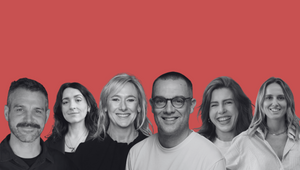
The New New Business: Jordan Smith Says Sales is Just the Ability to Have a Conversation

Jordan Smith is a self appointed ‘unofficial coffee critic’ who is always brewing up new ideas.
His previous role as senior recruitment consultant at Clicks IT Recruitment and FIRESOFT People has set the standard for his work with MINT Films. While the two industries may seem worlds apart at first glance, their core principles align.
His role as head of new business at MINT Films sees him drive growth, foster and build relationships, and provide a commercial insight to the production world.
LBB> What was your first sale or new business win?
Jordan> Moving here from the UK, I feel like we Brits often just stumble into sales. It’s not necessarily something we set out to do, but we somehow end up here.
My first sales role was in renewable energy, selling solar and batteries, and my first sale was a decent size. I remember being incredibly nervous; the anticipation was intense. When the customer gave me the thumbs-up, I froze for a second, completely unprepared for what to say next. It was probably just a couple of seconds, but it felt like forever.
The sense of accomplishment afterwards was incredible though, a surge of adrenaline and pride in actually closing the deal. It was an awesome feeling, and even now, I still get that same rush with every new business win, though now I’m able to keep the conversation going when the deal is closed!
LBB> What was the best piece of advice you got early on?
Jordan> "People buy from people they like." It sounds simple, but it’s incredibly powerful. I think it’s something like… 70% of buyers make their purchase decisions based on trust and likability with the salesperson. Building rapport isn’t just a nice bonus; it’s essential. At Mint Films, when clients connect with us personally, they're not just choosing a production company, they're investing in a creative partnership.
But always remember… you could be the most perfect banana, however, some people just don’t like bananas.
LBB> And the worst?
Jordan> “Push until they crack.” Awful advice. I’ve personally seen situations where sales reps push so hard that customers end up in tears, pressured into buying something they can’t afford. It’s not just unethical; it’s damaging in every way. Never be that person.
LBB> How has the business of ‘selling’ in the creative industry changed since you started?
Jordan> The business of 'selling' in the creative industry has shifted significantly. Previously, it was all about pitching the biggest ideas and impressing clients with flashy presentations. Now, clients expect a more personalised approach; they want a partner who understands their brand’s values and can bring authentic, tailored solutions to their challenges.
With the rise of digital platforms and data-driven insights, sales strategies have become much more strategic, too. Clients are looking for evidence of impact and results. It’s no longer just about creativity, it’s about measurable value. Relationship-building has also become even more important. Today, it’s less about making a sale in the moment and more about creating a trusted, ongoing partnership where the client sees you as an integral part of their brand’s story.
LBB> Can anyone be taught to sell or do new business or do you think it suits a certain kind of personality?
Jordan> I think anyone can do it, sales is just the ability to have a conversation, with some quick thinking. As long as you are able to understand the client’s pain points and show how your offering’s services can help them achieve that with relevant data… you have a good chance to win the business.
LBB> What are your thoughts about the process of pitching that the industry largely runs on?
Jordan> I think the pitching process has its place, but it could definitely be improved. I strongly feel that pitches should be compensated to ensure the time and effort invested is respected, though I doubt it will happen unless it becomes an industry wide movement.
As for ‘giving ideas away for free,’ the industry is notorious for idea-stealing. Clearer communication from clients upfront would also help agencies focus on truly tailored ideas without feeling exploited.
LBB> How do you go about tailoring your selling approach according to the kind of person or business you’re approaching?
Jordan> I always like using the four personality traits method (The Bull, Owl, Lamb, and Peacock) because it’s a great way to match the personality of the person you’re speaking with. This approach allows you to keep your pitch consistent but adapt the delivery.
For example, with a Bull, you’d be direct and results-focused, while with an Owl, you'd provide all the necessary data and analysis. This way, you’re engaging each person in a way that resonates with their style and priorities, ultimately making your pitch more effective.
LBB> New business and sales can often mean hearing ‘no’ a lot and quite a bit of rejection - how do you keep motivated?
Jordan> "Each ‘NO’ brings you closer to a ‘YES.’" Sales can be tough, and rejection is inevitable. I’d be lying if I said I don’t take some of those ‘no’s personally. You might hear a hundred ‘no’s for different reasons before landing that one ‘yes,’ so it’s crucial to stay motivated through it all. This mindset helps you keep pushing forward, even when it feels mentally exhausting.
LBB> The advertising and marketing industry often blurs the line between personal and professional friendships and relationships… does this make selling easier or more difficult and delicate?
Jordan> The blend of personal and professional relationships in advertising can make selling both easier and more delicate. Genuine connections build trust and make clients more receptive to new ideas, easing collaboration. However, it’s crucial to respect boundaries to ensure business decisions feel authentic, not pressured, keeping the relationship mutually beneficial.
LBB> In your view, what's the key to closing a deal?
Jordan> In my view, the key to closing a deal is ensuring alignment between your offerings and the customer's needs. While it's important to highlight how great your product or service is, you also need to ask the right questions and gather enough information to make sure you can actually deliver on what you're proposing. This not only builds trust but also strengthens the relationship for future business.
After all, no one likes to feel misled or encounter loopholes. That’s why the team at Mint believes that honest, transparent communication is essential for building lasting partnerships and driving long-term success.
LBB> There’s a lot of training for a lot of parts of the industry, but what’s your thoughts about the training and skills development when it comes to selling and new business?
Jordan> I think you can attend every training session, watch every video and read every book… but that doesn’t mean you’re ready to close a deal. Sales is definitely a learn as you go industry, understanding what works and what doesn’t for both your pitch and customer needs. Every conversation is different and you have to be able to adapt to that at the flick of a switch. This can only happen if you jump in the deep end but also takes time to learn, so don’t be afraid to mess it up… which you will, but this is a pinnacle opportunity for growth.
LBB> What’s your advice for anyone who’s not necessarily come up as a salesperson who’s now expected to sell or win new business as part of their role?
Jordan> Don’t be afraid to mess up, because it will happen. Just learn from each engagement and consider what you could have done better and don’t be afraid to ask for help.















